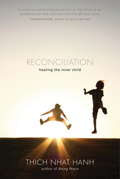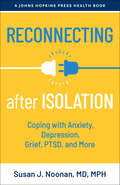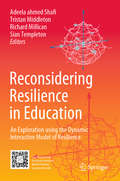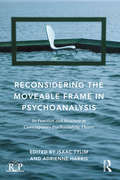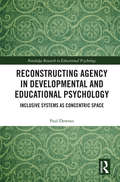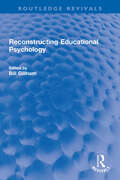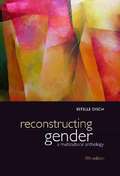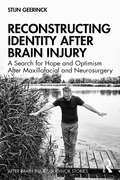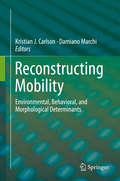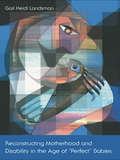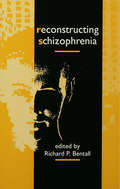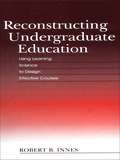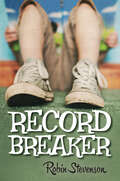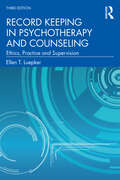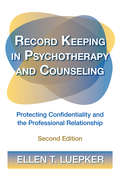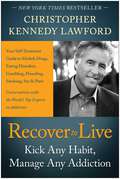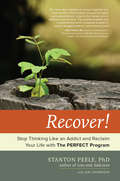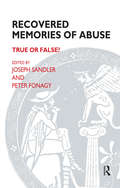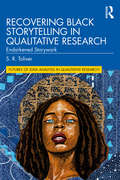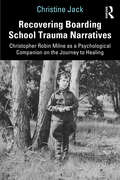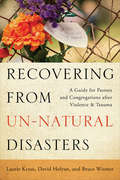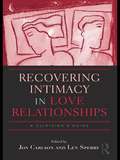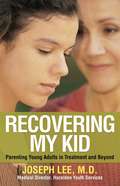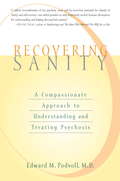- Table View
- List View
Reconciliation: Healing the Inner Child
by Thich Nhat HanhBased on Dharma talks by Zen Master Thich Nhat Hanh and insights from participants in retreats for healing the inner child, this book is an exciting contribution to the growing trend of using Buddhist practices to encourage mental health and wellness. Reconciliation focuses on the theme of mindful awareness of our emotions and healing our relationships, as well as meditations and exercises to acknowledge and transform the hurt that many of us experienced as children. The book shows how anger, sadness, and fear can become joy and tranquility by learning to breathe with, explore, meditate, and speak about our strong emotions. Reconciliation offers specific practices designed to bring healing and release for people suffering from childhood trauma. The book is written for a wide audience and accessible to people of all backgrounds and spiritual traditions.
Reconnecting after Isolation: Coping with Anxiety, Depression, Grief, PTSD, and More (A Johns Hopkins Press Health Book)
by Susan J. NoonanHow to keep calm, carry on, and reconnect during times of social isolation and emotional crisis.Although spending time alone for short periods may be restorative and helpful, unintentional or involuntary isolation can have profound detrimental effects on emotional and physical health. We all need social interaction and meaningful relationships in our lives to be well and thrive. Without them, we flounder. In Reconnecting after Isolation, Dr. Susan J. Noonan draws on our collective experience of the COVID-19 pandemic to help readers deal with the emotional impact of social isolation. Speaking as both a provider and recipient of mental health care services, Noonan combines her professional and personal experiences in an evidence-based and practical guide. Drawing on meticulous research and interviews with four psychologists, she outlines steps to overcome the emotional trauma of isolation.The book touches on how social isolation, loneliness, and stress affect each of us individually and can sometimes provoke depression, anxiety, post-traumatic stress disorder, suicidality, and substance use. Describing specific lifestyle interventions that may help, it offers tips for• developing effective coping skills• facing isolation-induced fears adapting effectively to the changes in our personal, family, work, academic, and social lives caused by imposed isolation• finding effective, culturally sensitive mental health care• improving sleep hygiene• building and maintaining resilience • adopting a healthy diet• overcoming the fatigue burnout • grieving a loss• engaging in regular physical exercise• keeping a daily routine or structure• maintaining contact with othersDr. Noonan also discusses re-entry anxiety, the challenging experience many have upon returning to their prior lifestyle, and the difficulty of establishing new school and work routines following social isolation. Accessible and compassionate, Reconnecting after Isolation empowers individuals to manage their own challenges, offering them a better chance of recovery and of staying well.
Reconsidering Resilience in Education: An Exploration using the Dynamic Interactive Model of Resilience
by Sian Templeton Tristan Middleton Adeela Ahmed Shafi Richard MillicanThis book explores the concept of resilience and its significance in responding to a rapid and ever-changing globalised world whilst critiquing its ‘buzzword’ status in contemporary times. Drawing on research from a range of educational settings, the book demonstrates that the resilience of individuals and their surrounding systems should not be viewed in isolation and that the interplay between individual resilience, community resilience and resilient societies is complex and symbiotic. On this basis, it illustrates that efforts to promote resilience would benefit from a systems approach capable of coping with this complexity.Using the ideas of agency and the power of self-determinism, a development of Bronfenbrenner's bio-ecological model is presented to illustrate the complexity of their interplay. Existing models of resilience are developed with the book offering the Dynamic Interactive Model of Resilience (DIMoR) as a way to analyse and support resilience which moves beyond a reductionist, descriptive and ‘fashionable’ presentation of resilience.
Reconsidering the Moveable Frame in Psychoanalysis: Its Function and Structure in Contemporary Psychoanalytic Theory (Relational Perspectives Book Series)
by Isaac Tylim Adrienne HarrisReconsidering the Moveable Frame in Psychoanalysis explores the idea of ‘the frame’ at a time when this concept is undergoing both systematic revival and widespread transformation. It has always been tempting to see the frame as a relatively static, finite and definable feature of psychoanalytic work. At its most basic, the frame establishes agreed upon conditions of undertaking psychoanalytic work. But as this book shows, the frame has taken on a protean quality. It is sometimes a source of stability and sometimes a site of ethical regulation or discipline. It can be a place of imaginative mobility, and in certain analytic hands, a device for psychic work on projections and disavowals. Beginning with a seminal essay on the frame by José Bleger, this book includes commentary on that work and proceeds to explorations of the frame across different psychoanalytic theories. The frame is perhaps one of the spots in psychoanalysis where psyche and world come into contact, a place where the psychoanalytic project is both protected and challenged. Inevitably, extra-transferential forces intrude onto the psychoanalytic frame, rendering it flexible and fluid. Psychoanalysts and analysands, supervisors and candidates are relying increasingly on virtual communication, a development that has effected significant revisions of the classical psychoanalytic frame. This book presents a dialogue among distinct and different voices. It re-examines the state and status of the frame, searching for its limits and sifting through its unexpected contents whilst expanding upon the meaning, purview and state of the frame. Reconsidering the Moveable Frame in Psychoanalysis will appeal to all psychoanalysts and psychoanalytic psychotherapists interested in how best to understand the frame and to use it most effectively in their clinical practice.
Reconstructing Agency in Developmental and Educational Psychology: Inclusive Systems as Concentric Space (Routledge Research in Educational Psychology)
by Paul DownesThis book reconstructs the foundations of developmental and educational psychology and fills an important gap in the field by arguing for a specific spatial turn so that human growth, experience and development focus not only on time but space. This regards space not simply as place. Highlighting concrete cross-cultural relational spaces of concentric and diametric spatial systems, the book argues that transition between these systems offers a new paradigm for understanding agency and inclusion in developmental and educational psychology, and for relating experiential dimensions to causal explanations. The chapters examine key themes for developing concentric spatial systemic responses in education, including school climate, bullying, violence, early school leaving prevention and students’ voices. Moreover, the book proposes an innovative framework of agency as movement between concentric and diametric spatial relations for a reconstruction of resilience. This model addresses the vital neglected issue of resistance to sheer cultural conditioning and goes beyond the foundational ideas of Bronfenbrenner’s ecological systems theory, as well as Vygotsky, Skinner, Freud, Massey, Bruner, Gestalt and postmodern psychology to reinterpret them in dynamic spatial systemic terms. Written by an internationally renowned expert, this book is a valuable resource for academics, researchers and postgraduate students in the areas of educational and developmental psychology, as well as related areas such as personality theory, health psychology, social work, teacher education and anthropology.
Reconstructing Educational Psychology (Routledge Revivals)
by Bill GillhamFirst published in 1978, Reconstructing Educational Psychology presents a new look at topics of central social concern such as children’s rights, the community approach to children’s problems, the inutility of traditional concepts of intelligence and personality, the interactionist approach to the concept of ‘deviant’ behaviour and the invalidity of psychiatric concepts of ‘maladjustment’. New ideas are the core of the book. It begins with historical and personal accounts of the origin and the nature of the situation of educational psychology. It spells out the way in which new thinking determines new practice, and the extent to which progress has been made. The book will be of interest to teachers, psychologists as well as to students of pedagogy and psychology.
Reconstructing Gender: A Multicultural Anthology
by Estelle DischReconstructing Gender is an anthology that addresses the contemporary experiences from a variety of women and men. Drawing from a wide range of sources including research articles, critical essays, and personal narratives, Disch has chosen accessible, engaging, and provocative readings that represent many perspectives and experiences. Eleven part-opening introductions identify important issues in the general field of study, describe the readings, remind the reader about some of the central themes emerging throughout the book, and raise questions for students to consider.
Reconstructing Identity After Brain Injury: A Search for Hope and Optimism After Maxillofacial and Neurosurgery (After Brain Injury: Survivor Stories)
by Stijn GeerinckReconstructing Identity After Brain Injury tells the remarkable story of Stijn Geerinck and his journey from road traffic accident to recovery. After he was hit by a drunk driver whilst cycling, Stijn suffered a traumatic brain injury and had to undergo drastic maxillofacial and neurosurgery. In his own words, this book narrates Stijn’s difficult recovery, focusing on the physical, medical, mental, social and financial changes he had to endure. It lays the groundwork for coping with permanent impairment resulting from TBI, including lifelong lesions and the irreversible physical changes. The testimonial narrative is complemented with philosophical insights, providing key philosopher’s reflections on the experience of brain injury. Stijn also explores the essential human characteristics of resilience, fighting spirit, emotionality, despair, vulnerability, hope, depression, optimism, anxiety, rationality, focus, anger and love, as he looks at the impact of his brain injury and resulting disfigurement on his masculine identity. It is essential reading for any professional involved in neuropsychological rehabilitation, and all those touched by this condition.
Reconstructing Mobility
by Kristian J. Carlson Damiano MarchiAssembles a collection of experts to provide a current account of different approaches (e. g. , traditional, comparative and experimental) being applied to study mobility. Moreover, the book aims to stimulate new theoretical perspectives that adopt a holistic view of the interaction among intrinsic (i. e. skeletal) and extrinsic (i. e. environmental) factors that influence differential expression of mobility. Since the environment undoubtedly impacts mobility of a wide variety of animals, insights into human mobility, as a concept, can be improved by extending approaches to investigating comparable environmental influences on mobility in animals in general. The book teases apart environmental effects that transcend typical categories (e. g. , coastal versus inland, mountainous versus level, arboreal versus terrestrial). Such an approach, when coupled with a new emphasis on mobility as types of activities rather than activity levels, offers a fresh, insightful perspective on mobility and how it might affect the musculoskeletal system.
Reconstructing Motherhood and Disability in the Age of Perfect Babies
by Gail LandsmanExamining mothers of newly diagnosed disabled children within the context of new reproductive technologies and the discourse of choice, this book uses anthropology and disability studies to revise the concept of "normal" and to establish a social environment in which the expression of full lives will prevail.
Reconstructing Schizophrenia
by Richard P. Bentall`The summaries of evidence have provided ready-made challenges to previously unquestioned medical options ... the book provides a challenging update on the nature of scientific inquiry.' - British Journal of Clinical PsychologyDespite nearly one hundred years of research, very little progress has been achieved in the understanding of schizophrenic behaviour. There remains considerable uncertainty even about the fundamental features of the hypothesised illness.Reconstructing Schizophrenia subjects the difficult concept of schizophrenia to rigorous scientific, historical and sociological scrutiny. They ask why a biological defect has been assumed in the absence of hard evidence and look at what can be done psychologically to alleviate schizophrenic symptoms. Finally, they explore what new models and research strategies are required in order to understand schizophrenic behaviour. The result is a book that provides a distinctive and critical perspective on modern psychiatric theories and which demonstrates the severe limitations of an exclusively medical approach to understanding madness.
Reconstructing Undergraduate Education: Using Learning Science To Design Effective Courses
by Robert B. InnesThis book is designed to introduce professors and administrators in higher education to the philosophical, theoretical, and research support for using a constructivist perspective on learning to guide the reconstruction of undergraduate education. It presents an original framework for systematically linking educational philosophy and learning theories to their implications for teaching practice. In this volume, Innes summarizes the sources he found most useful in developing his own set of teaching principles and course development process, and makes an argument for a particular perspective on learning--transactional constructivism--which is consistent with the philosophy of John Dewey and supported by current theory and research in learning science. Transactional constructivism, a combined approach, builds on the strengths of two competing views: psychological constructivism and the sociocultural perspective. Reconstructing Undergraduate Education: Using Learning Science to Design Effective Courses: *overviews the philosophical and theoretical underpinnings of the teaching model that is the focus of the volume; *presents a summary of Dewey's educational philosophy and connects his work to current theory and research in learning science; *examines psychological constructivism, one of the basic positions within the range of learning theories that takes a constructivist perspective; *offers a case study example of a course designed and taught from this perspective; *reviews the sociocultural and the transactional constructivist perspectives; *explores the quality of dialogue and disciplinary discourse in the classroom--an issue that is critical to the success of models derived from a transactional constructivist perspective on learning; and *explores broader issues related to reform in higher education. This volume is a vital resource for all professionals involved in undergraduate education.
Reconstruction of Wave-Particle Duality and its Implications for General Chemistry Textbooks
by Mansoor Niaz Cecilia MarcanoIt goes without saying that atomic structure, including its dual wave-particle nature, cannot be demonstrated in the classroom. Thus, for most science teachers, especially those in physics and chemistry, the textbook is their key resource and their students' core source of information. Science education historiography recognizes the role played by the history and philosophy of science in developing the content of our textbooks, and with this in mind, the authors analyze more than 120 general chemistry textbooks published in the USA, based on criteria derived from a historical reconstruction of wave-particle duality. They come to some revealing conclusions, including the fact that very few textbooks discussed issues such as the suggestion, by both Einstein and de Broglie, and before conclusive experimental evidence was available, that wave-particle duality existed. Other large-scale omissions included de Broglie's prescription for observing this duality, and the importance of the Davisson-Germer experiments, as well as the struggle to interpret the experimental data they were collecting. Also untouched was the background to the role played by Schrödinger in developing de Broglie's ideas. The authors argue that rectifying these deficiencies will arouse students' curiosity by giving them the opportunity to engage creatively with the content of science curricula. They also assert that it isn't just the experimental data in science that matters, but the theoretical insights and unwonted inspirations, too. In addition, the controversies and discrepancies in the theoretical and experimental record are key drivers in understanding the development of science as we know it today.
Record Breaker
by Robin StevensonIt's 1963, and Jack's family is still reeling from the SIDS death of his baby sister. Adrift in his own life, Jack is convinced that setting a world record will bring his father back to his senses and his mother back to life. But world events, including President Kennedy's assassination, threaten to overshadow any record Jack tries to beat—from sausage eating to face slapping. Nothing works, and Jack is about to give up when a new friend suggests a different approach that involves listening to, not breaking, records.
Record Keeping in Psychotherapy and Counseling: Ethics, Practice and Supervision
by Ellen T. LuepkerRecord Keeping in Psychotherapy and Counseling: Ethics, Practice and Supervision, grounded in contemporary challenges, emphasizes protecting the therapeutic and supervisory relationship through offering an essential framework for thoughtful record keeping within legal, ethical, supervisory, and clinical contexts. A reader-friendly conversational style plus compelling case examples from a variety of settings—clinic to courtroom—bring dilemmas and strategies to life. New case studies invite readers to examine principles of ethical decision-making in order to reach sound decisions, meeting a critical need in training and continuing education. New material on telehealth and electronic records, the impact of digital communications on the therapeutic relationship, and experience implementing the Health Insurance Portability and Accountability Act (HIPAA) bring this book up to date. Sample forms for readers’ use and modification are available on the publisher's website. Practitioners in all mental health disciplines, from students to seasoned clinicians, the supervisors, and teachers will continue to rely on this book for protecting themselves, their patients, and their trainees.
Record Keeping in Psychotherapy and Counseling: Protecting Confidentiality and the Professional Relationship
by Ellen T. LuepkerRecord Keeping in Psychotherapy and Counseling provides an essential framework for understanding record keeping within legal, ethical, supervisory, and clinical contexts. Compelling case examples identify dilemmas and strategies in protecting confidentiality. More than a simple reference book, this text introduces the concept of using records as therapeutic tools to strengthen the therapeutic relationship and facilitate clinical supervision. Appendices and an accompanying CD offer sample forms. A reader-friendly style makes this new edition appropriate for undergraduate and graduate students. New material on electronic records, the impact of electronic communication, and practitioners’ experiences with implementing the Health Insurance Portability and Accountability Act bring this book up to date. Everyone from students to seasoned practitioners will continue to rely on it for protecting themselves, their patients, and their trainees.
Recover to Live: Kick Any Habit, Manage Any Addiction: Your Self-Treatment Guide to Alcohol, Drugs, Eating Disorders, Gambling, Hoarding, Smoking, Sex, and Porn
by Christopher Kennedy LawfordFrom New York Times bestselling author of Symptoms of Withdrawal and Moments of Clarity Christopher Kennedy Lawford comes a book that will save lives. For most of his early life, Christopher Kennedy Lawford battled life-threatening drug and alcohol addictions. Now in recovery for more than 25 years, he works to effect change and raise global awareness of addiction in nonprofit, private, and government circles, serving as the goodwill ambassador for drug dependence treatment and care for the United Nations. For the first time, Recover to Live brings together all of the most effective self-care treatments for the seven most toxic compulsions affecting every culture on the planet today—alcohol dependence, drug dependence, eating disorders, gambling, hoarding, smoking, sex, and porn. In Recover to Live, more than 100 of the world's top experts interviewed by Lawford share their research and wisdom on how to determine if your bad habit is becoming a dependency, what treatments will work best for you, how best to help yourself or a loved one recover from addiction, and how to lead a fulfilling and productive life in recovery.
Recover!: Stop Thinking Like an Addict and Reclaim Your Life with The PERFECT Program
by Stanton Peele Ilse ThompsonFor decades you've been told that addiction is an irreversible disease, a biological force over which you have no control. That defeatist message not only is without scientific foundation, but actually prevents your overcoming addiction. Now, world-renowned addiction expert Stanton Peele demystifies addiction and offers a groundbreaking program that puts at your disposal what does work in treatment and recovery. For four decades, Dr. Peele has challenged our understanding of addiction and recovery. He has developed approaches that break the cycle of addiction and empower us to take control of our lives--including understanding that we are able to direct our own brains to change. In Recover! Dr. Peele's PERFECT Program takes you through the key concepts of mindfulness--that is, your ability to detach from your addictive experience and to see that it is not who you are--combined with the Buddhist idea of loving kindness, or self-acceptance. It's an easily grasped, yet multifaceted program that allows your true self to overcome your addictive urges. Instead of focusing on what's wrong with you, the PERFECT Program will help you discover, embrace, and build your recovery on what's already right about you. Combining the best evidence-based treatments with the mindful use of meditation, Recover! presents a life-transforming philosophy for freeing yourself from addiction forever.
Recovered Memories of Abuse: True or False? (The\psychoanalytic Monograph Ser. #No. 2)
by John Morton Peter Fonagy Mary Target Susie Orbach Valerie Sinason Arnon Bentovim Hanna Segal Christopher Cordess Judith Trowell Phil Mollon Eric Rayner Alan D. Baddeley Joseph Sandler Anne-Marie Sandler Brendan MacCarthy Lawrence WeiskrantzThese papers - from a conference with the same title - includes work by Lawrence Weiskrant (highlighting the concerns around false memories), John Morton (outlining contemporary models of memory), and Valerie Sinason (on detecting abuse in child psychotherapy). The second half presents a psychoanalytic theory of false memory syndrome, by the authors then offer a final overview.
Recovering Black Storytelling in Qualitative Research: Endarkened Storywork (Futures of Data Analysis in Qualitative Research)
by S.R. ToliverThis research-based book foregrounds Black narrative traditions and honors alternative methods of data collection, analysis, and representation. Toliver presents a semi-fictionalized narrative in an alternative science fiction setting, refusing white-centric qualitative methods and honoring the ways of the griots who were the scholars of their African nations. By utilizing Black storytelling, Afrofuturism, and womanism as an onto-epistemological tool, this book asks readers to elevate Black imaginations, uplift Black dreams, and consider how Afrofuturity is qualitative futurity. By centering Black girls, the book considers the ethical responsibility of researchers to focus upon the words of our participants, not only as a means to better understand our historic and current world, but to better situate inquiry for what the future world and future research could look like. Ultimately, this book decenters traditional, white-centered qualitative methods and utilizes Afrofuturism as an onto-epistemological tool and ethical premise. It asks researchers to consider how we move forward in data collection, data analysis, and data representation by centering how Black girls reclaim and recover the past, counter negative and elevate positive realities that exist in the present, and create new possibilities for the future. The semi-fictionalized narrative of the book highlights the intricate methodological and theoretical work that undergirds the story. It will be an important text for both new and seasoned researchers interested in social justice. Informed and anti-racist researchers will find Endarkened storywork a useful tool for educational, cultural, and social critiques now and in the future.
Recovering Boarding School Trauma Narratives: Christopher Robin Milne as a Psychological Companion on the Journey to Healing
by Christine JackRecovering Boarding School Trauma Narratives: Christopher Robin Milne as a Psychological Companion on the Journey to Healing is a unique, emotive and theorised narrative of a young girl’s experience of boarding school in Australia. Christine Jack traces its impact on the emerging identity of the child, including sexual development and emotional capacity, the transmission of trauma into adulthood and the long process of recovery. Interweaving her story with the experiences of Christopher Robin Milne, she presents her memoir as an exemplar of how narrative writing can be employed in remembering and recovering from traumatic experiences. Unique and powerfully written, Jack takes the reader on a journey into her childhood in Australian boarding school convents in the 1950s and 1960s. Comparing her experience with Christopher Robin Milne’s, she interrogates his memoirs, illustrating that boarding school trauma knows no boundaries of time and place. She investigates their emerging individuality before being sent to live an institutional life and traces their feelings of longing and loneliness as well as the impact of the abuse each endured there. As an educational historian, Jack writes in a ground-breaking way from the perspective of an insider and outsider, revealing how trauma remains in the unconscious, wielding power over the life of the adult, until the traumatic memories are recovered, emotions released and associated dysfunctional behaviour changed, restoring well-being. Engaging the lenses of history, life-span and Jungian psychology, feminist and trauma theory and boarding school trauma research, this book positions narrative writing as a way of reducing the power of trauma over the lives of survivors. Personal and accessible, this book will be essential reading for psychologists and educational historians, as well as students and academics of psychology, sociology, trauma studies, ex-boarders and those interested in the life of Christopher Robin Milne.
Recovering From Un-Natural Disasters: A Guide For Pastors And Congregations After Violence And Trauma
by Laurie Kraus David Holyan Bruce WismerRecovering from Un-Natural Disasters is a must-read handbook for pastors and church leaders of communities who could or perhaps already have experienced an un-natural disaster, such as gun violence, suicides, or sexual abuse. <P><P>Unlike natural disasters, un-natural disasters deal with the concept of sin and require a different recovery strategy. In this book, readers will explore the four phases of human-caused disaster — Devastation and Heroism, Disillusionment, Reforming, and Wisdom — and receive step-by-step suggestions to use with their faith community during the recovery process. Example worship resources, including prayers, music suggestions, and sermons that are appropriate to use during periods of trauma and recovery, are included.
Recovering Intimacy in Love Relationships: A Clinician's Guide (Routledge Series on Family Therapy and Counseling)
by Jon Carlson Len SperryThe loss of intimacy is one of the most difficult—but also one of the most common—factors in the destruction of any relationship. Recovering Intimacy in Love Relationships lays out practical, evidence-based guidelines on which clinicians can depend as they wade through the intense emotions and fragile bonds of couples in crisis. With care and sensitivity, the book's authors analyze the increasingly complex context in which the cycle of intimacy develops, wanes, and recovers. The chapters delve into diverse populations' attitudes toward intimacy and provide an entire section on cultural, gender and religious issues. Clinicians looking for a research-based, practical take on the many facets of intimacy in the twenty-first century need look no further than this book.
Recovering My Kid: Parenting Young Adults in Treatment and Beyond
by Joseph LeeNational expert Dr. Joseph Lee explains the nature of youth addiction and treatment, and how families can create a safe and supportive environment for their loved ones during treatment and throughout their recovery.National expert Dr. Joseph Lee explains the nature of youth addiction and treatment, and how families can create a safe and supportive environment for their loved ones during treatment and throughout recovery.Raising a child is tough as it is, but when your kid becomes addicted to alcohol or other drugs, it can feel as if you’re living a nightmare. You’re not alone. In Recovering My Kid, Dr. Joseph Lee, a leading youth addiction specialist, takes worried, confused, and angry parents by the hand and addresses their most pressing questions and fears: What is addiction? What happens when my child returns home from treatment? How can my family support his or her recovery? What if my child relapses? How can my family get well again?Getting your child and your family well again requires the support and understanding of the whole family, even if feelings and trust were damaged. In his engaging and straightforward style, Lee explains the difficult concepts of addiction, treatment, and recovery in a way parents and families can understand and gives them concrete strategies they can put into practice.This book will help family members begin to understand what their loved one is going through and how they can help the addict adjust to a clean-and-sober life while still taking care of themselves.
Recovering Sanity: A Compassionate Approach to Understanding and Treating Pyschosis
by E PodvollRecovering Sanity is a compassionately written examination of the experience of psychosis and related mental illnesses. By presenting four in-depth profiles of illness and recovery, Dr. Edward Podvoll reveals the brilliance and chaos of the psychotic mind and demonstrates its potential for recovery outside of traditional institutional settings. Dr. Podvoll counters the conventional thinking that the millions of Americans suffering from psychosis can never fully recover. He offers a bold new approach to treatment that involves home care with a specially trained team of practitioners. Using "basic attendance," a treatment technique inspired by the author's study of Buddhist psychology, healthcare professionals can use the tools of compassion and awareness to help patients recover their underlying sanity. Originally published as The Seduction of Madness, this reissue includes new introductory material and two new appendices.
